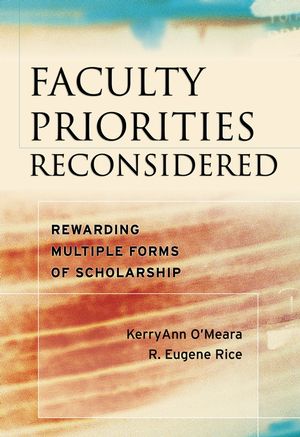Faculty Priorities Reconsidered: Rewarding Multiple Forms of ScholarshipISBN: 978-0-7879-7920-1
Hardcover
368 pages
August 2005, Jossey-Bass
 This is a Print-on-Demand title. It will be printed specifically to fill your order. Please allow an additional 10-15 days delivery time. The book is not returnable.
|
||||||
No reform effort in American higher education in the last twenty
years has been more important than the attempt to enlarge the
dominant understanding of the scholarly work of facult--what counts
as scholarship. Faculty Priorities Reconsidered assesses the
impact of this widespread initiative to realign the priorities of
the American professoriate with the essential missions of the
nation's colleges and universities: to redefine faculty roles and
restructure reward systems.
Faculty Priorities Reconsidered traces the history of the movement to redefine scholarship: examining the impact of the 1990 landmark report Scholarship Reconsidered: Priorities of the Professoriate from The Carnegie Foundation for the Advancement of Teaching, and the decade-long work of the American Association for Higher Education's Forum on Faculty Roles and Rewards that initiated and sustained much of the work reported on here. The struggles to move beyond narrow definitions of research, to distinguish between scholarly teaching and the scholarship of teaching while acknowledging the importance of both, to encourage faculty engagement in meeting the scholarly needs of the larger civic community, and to recognize the importance of academic synthesis and integration--all elements of a broader understanding of scholarship--are addressed in this book.
Faculty Priorities Reconsidered traces the history of the movement to redefine scholarship: examining the impact of the 1990 landmark report Scholarship Reconsidered: Priorities of the Professoriate from The Carnegie Foundation for the Advancement of Teaching, and the decade-long work of the American Association for Higher Education's Forum on Faculty Roles and Rewards that initiated and sustained much of the work reported on here. The struggles to move beyond narrow definitions of research, to distinguish between scholarly teaching and the scholarship of teaching while acknowledging the importance of both, to encourage faculty engagement in meeting the scholarly needs of the larger civic community, and to recognize the importance of academic synthesis and integration--all elements of a broader understanding of scholarship--are addressed in this book.



